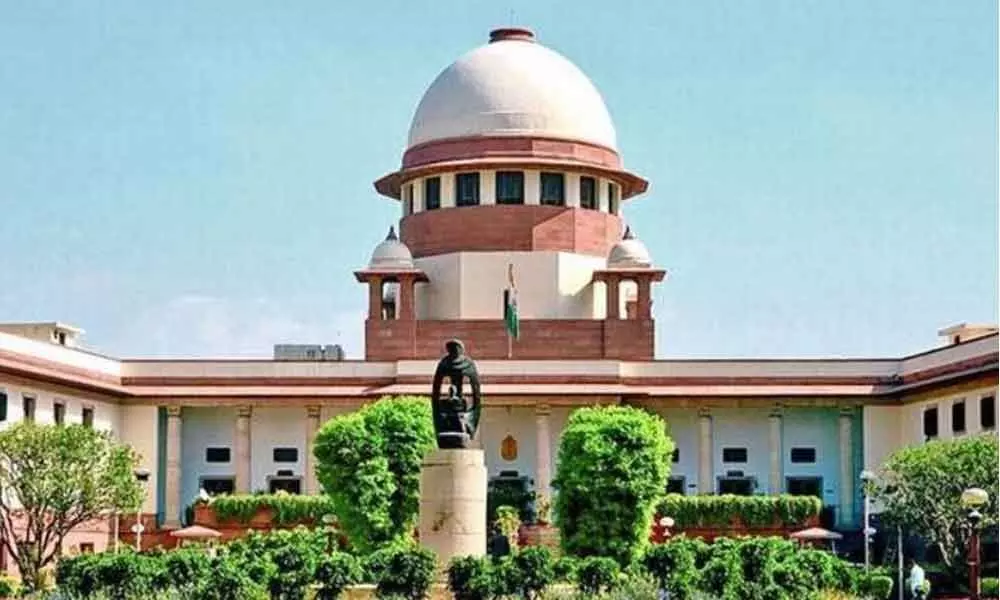Live
- Indian startups raise over $182 million in funding this week
- Use of VPNs 'un-Islamic', declares Pakistan's Council of Islamic Ideology
- AP Dy CM, assembly speaker condoles death of former MLA Nara Rammurthy Naidu
- Senegal wraps up campaigning for legislative elections ahead of vote on Nov 17
- Free Study Materials Distributed to Needy MBBS Freshers by Seniors
- Boeing lays off over 400 members of professional aerospace union
- An egg a day may boost memory, brain functions in women: Study
- Ready for debate on BRS 10 year rule and Congress one year's, TPCC Chief Mahesh Goud
- Director Arjun Jandhyala speaks about ‘Devaki Nandana Vasudeva’
- Amitabh Bachchan praises Bihar’s ‘LittiChokha’
Just In

Outstation patients at Dr Banerjee's clinic here ask him to prescribe extra medicines, just in case there is trouble after Supreme Court pronounces its verdict on the Ram Janmabhoomi-Babri Masjid dispute and they can't visit him sooner.
Ayodhya : Outstation patients at Dr Banerjee's clinic here ask him to prescribe extra medicines, just in case there is trouble after Supreme Court pronounces its verdict on the Ram Janmabhoomi-Babri Masjid dispute and they can't visit him sooner.
Indroneel Banerjee says he tells them to have faith. "All is well. And God willing, all will be well in future as well."
"The atmosphere is by and large normal. People are feeling a bit apprehensive, but they are not afraid," he told PTI on Thursday. "People in Ayodhya, whether they are Hindus or Muslims, want peace and development in the city.
People of the temple city, Hindus and Muslims, are sure there will be no clashes between them," he said. "I feel that a clash will take place only if external elements arrive to disturb the peace of this place," he said.
But some of his patients are on edge. "Patients come to me from neighbouring districts and remote areas of Ayodhya. All they say is, doctor sahib, give us extra 15 days' medicine so that we come next only towards the end of the month," he said.
The verdict on the temple-mosque land dispute is expected to be pronounced before Chief Justice of India Ranjan Gogoi retires on November 17. Banerjee hoped it will be an "amicable settlement".
"People in Ayodhya want the dispute to be resolved at the earliest. This mandir issue has done more damage than good to Ayodhya.
Business has moved out of Faizabad, young entrepreneurs do not want to set up their establishments in the temple town," he said. Shopkeeper Shriprakash Singh is worried about his business.
"For the past one year, we have not done good business because of a recession in the market. Now, for one month, to the Ayodhya verdict, our business is suffering because in other cities there is much panic over Ayodhya," he said.
According to him, Ayodhya traders are not getting to buy on credit from them. A local teacher said the administration appears prepared to handle the situation.
"I feel that the situation is absolutely normal in Ayodhya as compared to the previous years. No one needs to feel afraid," said Krishna Nath Singh, a sports teacher at a government school.
Prajwal Singh, who runs a shop near Hanumangarhi area of Ayodhya said he feels no fear.
"In fact, I am eagerly waiting for the historic verdict. Residents of Ayodhya will welcome it wholeheartedly. We need to understand that we have to put our past behind and move towards a glorious future that awaits us," he said.
Uday Singh, another doctor with a clinic near Tulsi Udyaan, dismissed the possibility of any trouble if the verdict is seen as being in favour of one community.
"The people of Ayodhya are mature and have moved on considerably from the days of temple politics," he said. "Apart from this, the arrangements made this time seem to be better than in the past regimes.
So, I don't feel anyone needs to feel afraid." But the large deployment of police itself creates apprehension among some.
"On one side, the administration and the state government are saying that nothing would happen and on the other, they are deploying heavy security, turning Ayodhya into a cantonment.
This has left us worried," said Saurabh Singh, a schoolteacher. Zeeshan Kidwai, another schoolteacher, said though the administration has said that everything would pass off smoothly, parents are worried over the situation in the days following the judgment.
"They are constantly asking us how the school will run and how they can send their children to school," she said. Ram Shankar Tripathi, a retired professor and a Hindi writer, also raised concerns over "outsiders" disturbing the peace.
"We are less interested in what the verdict is, but more interested that the country must not go back to 1992, when Babri Masjid was demolished.
Here, the local Hindus and Muslims have a very harmonious relationship, but we scared of outsiders," he said. Social activist Afzal Ahmad echoed the sentiment.
He said Muslims had no fear of Hindus as both communities had lived in harmony for ages.

© 2024 Hyderabad Media House Limited/The Hans India. All rights reserved. Powered by hocalwire.com







